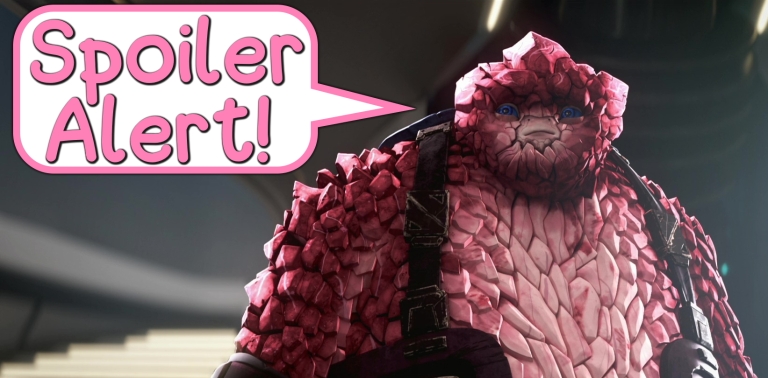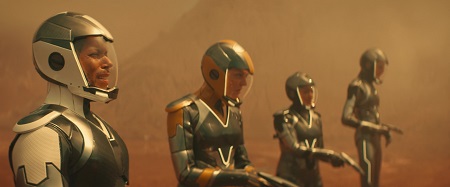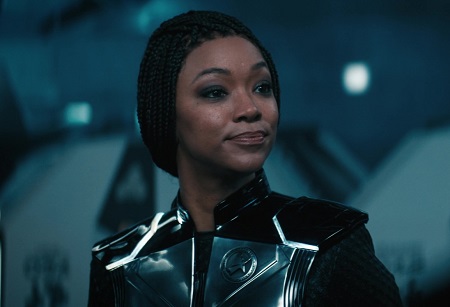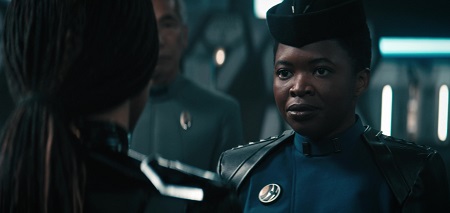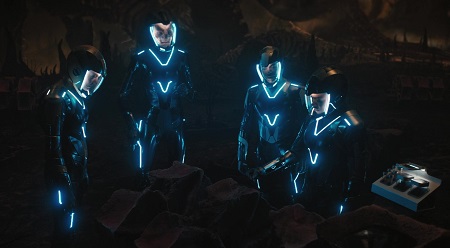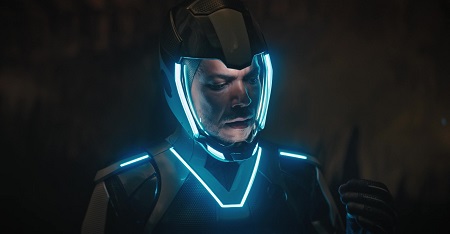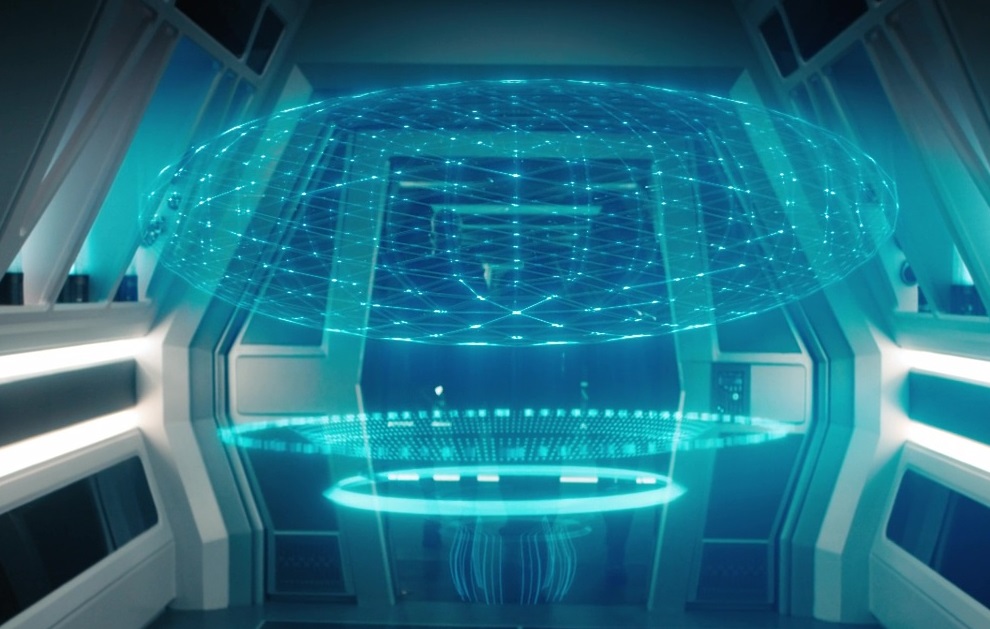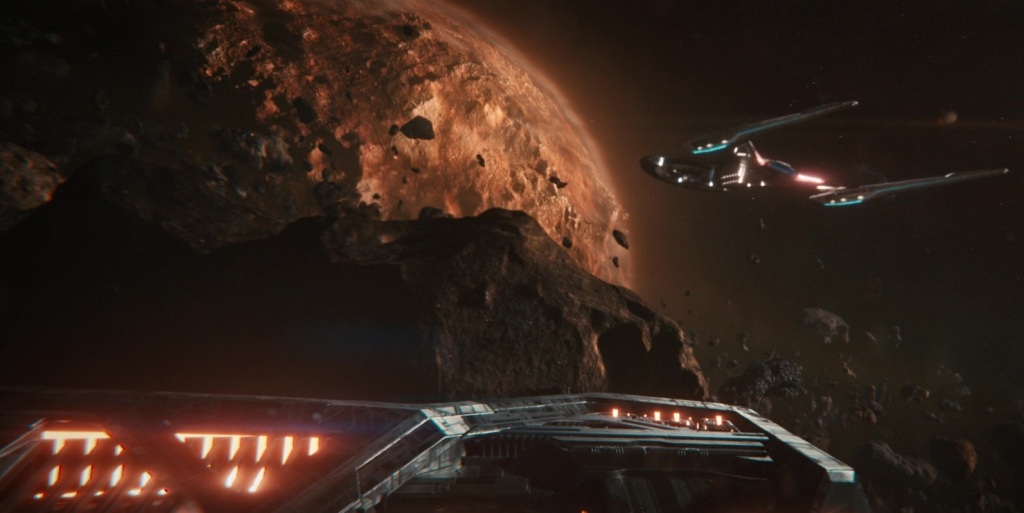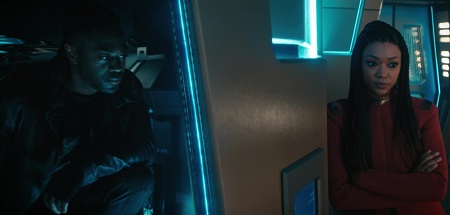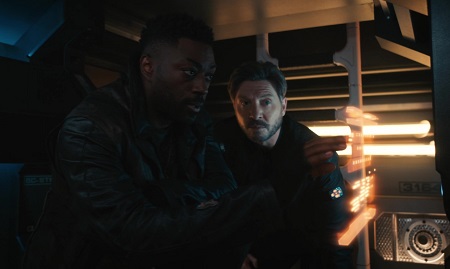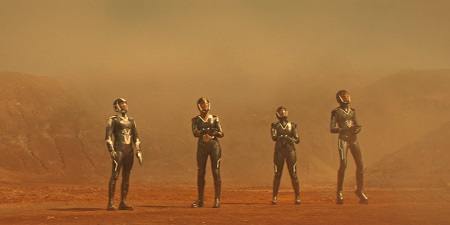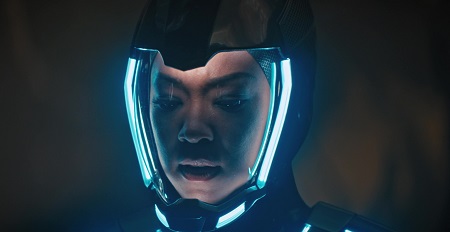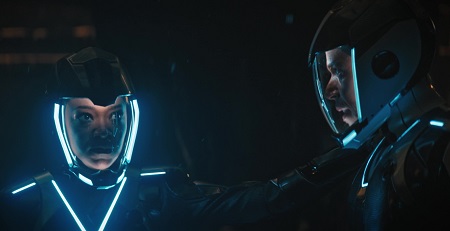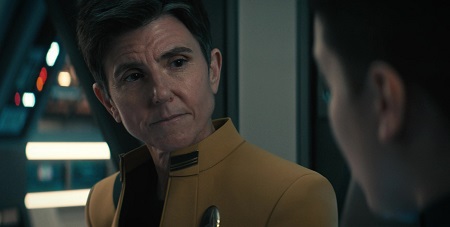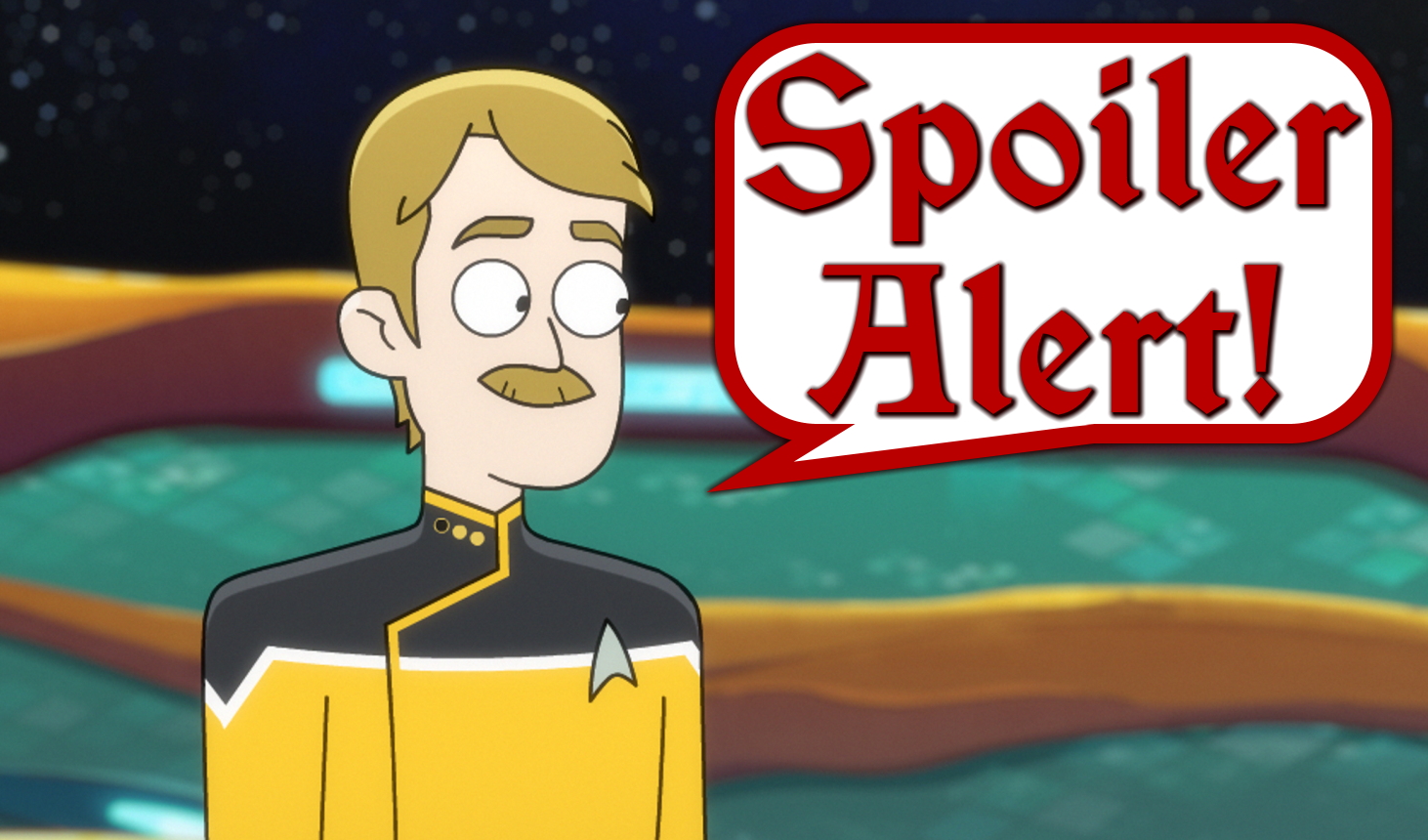
Spoiler Warning: There are spoilers ahead for Star Trek: Discovery Seasons 1-4.
Species Ten-C wasn’t just a good episode in its own right, with plenty of excitement and tension that showed how Star Trek can do a heck of a lot without resorting to violence and battles, but it was one that made the episode immediately preceding it significantly better in retrospect. I wrote last week that the one saving grace to an otherwise frustrating experience in Rosetta could be if the hydrocarbons discovered by Captain Burnham and the away team were put to good use – and that happened in a big way this time.
On the other side of the story, I finally felt what I believe the writers have been aiming for for weeks with the Book and Tarka storyline: that Captain Burnham was right, diplomatic initiatives should be given a chance, and that Book has fallen victim to Tarka’s manipulations. While this has the unfortunate effect of relegating Tarka from a complex character with an equally understandable motivation into the out-and-out villain of the season’s final couple of episodes, it clarifies what had been until now a very fuzzy and occasionally frustrating story.
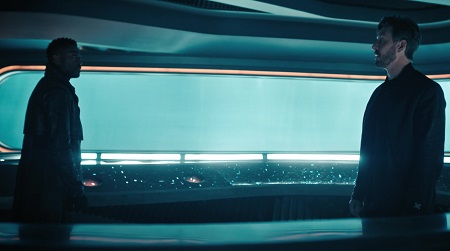
If I were to be critical of Species Ten-C, what I’d say is that it probably took too long for the season to reach this point. Several advances in the DMA/Unknown Species 10-C storyline were sprinkled in at or near the end of unrelated or tangentially-related episodes, with the Federation often running into problems or delays that took too long to surmount, and the result of that is that it took a long time to arrive at the hyperfield.
The story of finding a way to bridge the communication divide could have been a longer one, and it was handled in a genuinely interesting way – but with only half an episode dedicated to it here and just one final episode of the season remaining, it’s an interesting concept that may not be explored in as much detail as it could have been.
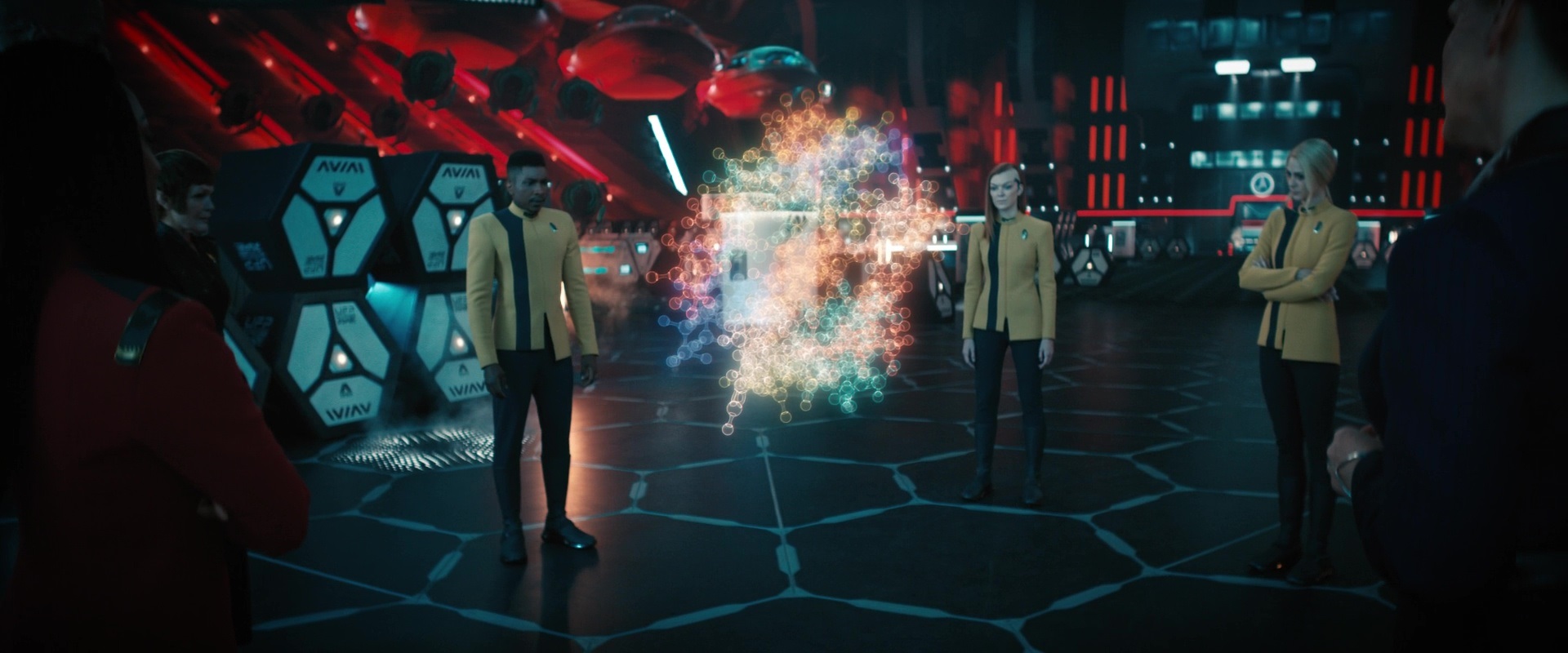
This story of learning how to communicate with someone far more alien than usual, and doing so while under threat thanks to the DMA, is not one that required a B-plot villain. While Tarka was interesting in his earlier appearances and his motivations were laid out in a clearly understandable way, the narrative just doesn’t require this additional element in order to be exciting.
Discovery has a tendency, as I’ve pointed out on a number of previous occasions, to try to inject double the tension and three times the drama when it just isn’t necessary, and if I were to make one comment about the series as a whole it’s that the writers need to have more confidence in their stories. Dropping the Tarka angle, or reworking it to make him less of an antagonist in this final chapter, would allow the main story of learning to communicate with Unknown Species 10-C to stand on its own – and as it’s already sufficiently tense, interesting, and engaging, Tarka’s villainy just isn’t necessary.
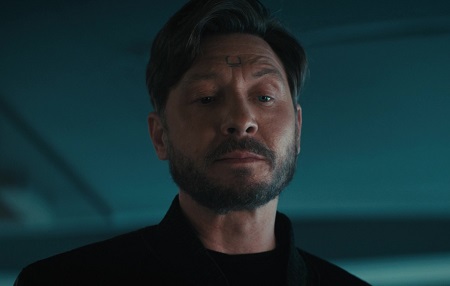
Not for the first time, Discovery has set up a character who feels well-rounded and complex, with motivations that seem understandable, only to turn them into a pretty standard villain later on. I wouldn’t have even called Tarka “morally ambiguous;” his weapon plan made a lot of sense when it was first proposed, and I even suggested that a show which has had themes of seeking a “middle ground” could have figured out a way to keep Tarka on board, building his weapon as a back-up plan while attempting to make first contact. But as with Captain Lorca in Season 1, much of Tarka’s nuance now feels lost; brushed aside because the writers determined that the season needs a villain.
There were other ways to formulate this story that either skipped over Tarka altogether or that kept him in that complex space. We may yet learn that his interdimensional transporter will be important, in which case he may have served a narrative function, but if the ending of the story is going to be Tarka’s defeat or death, with a reunion with Oros not being able to happen, then I think I’ll have to go back and re-evaluate his role in the season overall. This story already had the complexities of Unknown Species 10-C and the DMA; I’m not sure it needed a second antagonist, especially not one who seems to have come at the expense of an interesting and complex character.
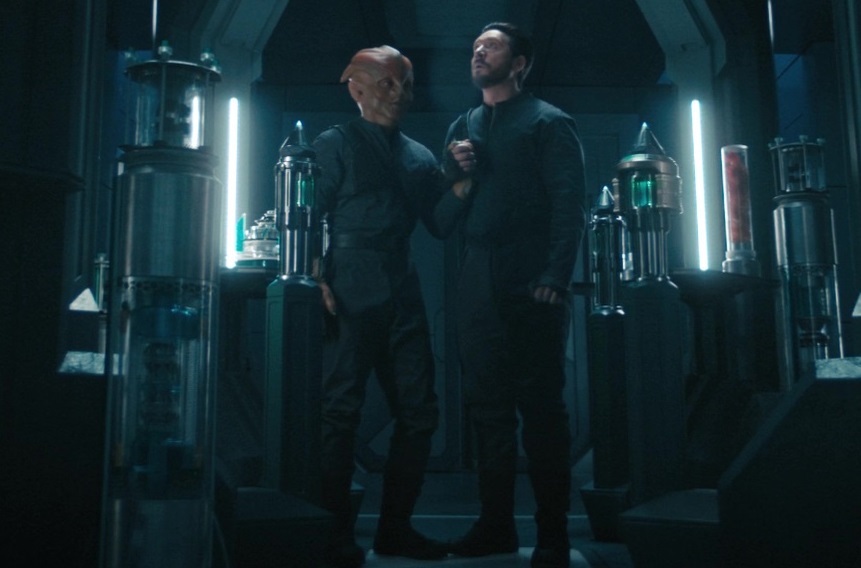
We’ve also got to talk about the new character of Dr Hirai. In short, he needs to do something truly outstanding and unique next week – otherwise his inclusion in the season will have proven to be a complete and utter waste of a great actor. I like the concept of the character; a linguistics and communications expert seems perfect for this kind of mission. But in his two earlier appearances this season he did nothing whatsoever, and his accomplishments this week were relatively minor. It didn’t feel like bringing Dr Hirai along was in any way important to the success of the mission, with Captain Burnham, Zora, Saru, and even characters like Detmer, Nilsson and the very minor Lieutenant Christopher all contributing at least as much – if not more – to the story as he did.
He was ultimately sidelined by President Rillak, who chose Saru and Burnham over him for their linguistics and first contact expertise, confirming his relegation to a bit-part role at best. In light of what happened last week with Rosetta, I’m willing to wait and see if Dr Hirai will yet make a significant contribution – but with only one episode left in which to do so, he needs to do something big pretty quickly or we’ll unfortunately have to consider his inclusion in the story a bit of a let-down.
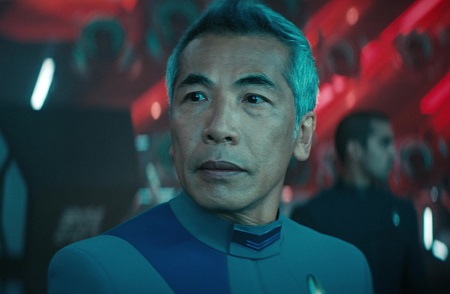
There is one concept underlying the way Unknown Species 10-C reacted to Discovery’s arrival – and the conversation it prompted between Captain Burnham and the others – that I didn’t like. As humans, we’re able to recognise signs of intelligence in other species, even though we’re far more advanced and intelligent than they are. We can recognise the complex social structures present in ant colonies, for example, or how crows and some great apes are learning to use tools. Even though these creatures are far lower on the intelligence scale than we are, we’re able to determine quite easily that animals – even small and lowly ones – can exhibit signs of complex understanding and intelligence.
With that in mind, the idea that Unknown Species 10-C would see a starship arriving at warp speed, using a warp core and a spore drive, built from clearly artificial alloys, and somehow not understand that the creatures aboard it are sentient makes no sense. This species is supposedly much farther advanced than even the 32nd Century Federation, and even though they exist outside of the galaxy they must have the ability to scan and detect the existence of other sentient species, even if they choose not to interact with them. It’s conceivable that they might be selfish and not care about any other species besides themselves – but the idea that they would be unaware or incapable of determining intelligence in this situation is one that I can’t buy as a believable story point.
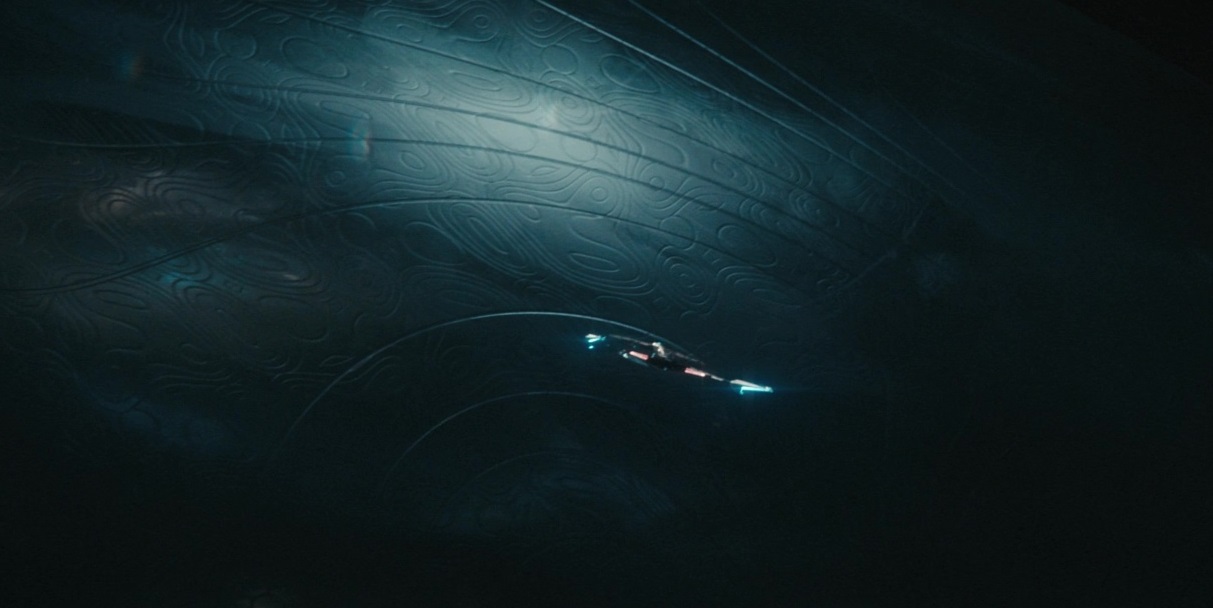
It seemed at first as though Species Ten-C was going to centre on this aspect of first contact, and I was certainly a little disappointed at first. But thankfully this didn’t last too long, with Unknown Species 10-C eventually getting the message and realising that the life-forms aboard the warp-capable starship are actually intelligent. Took them long enough!
I know that probably sounds like a nitpick – and it is, in a way. It’s just that, despite all of the talk of Unknown Species 10-C being very alien and having a very different culture, some things should be universally obvious – like if someone is capable of building a starship that can travel faster than the speed of light, use metal alloys that don’t exist in nature, and fly right up to your base to initiate contact, it’s probably a safe bet to assume that they possess some degree of intelligence. That should apply no matter who you are! And as pointed out above, humans are capable of recognising the signs of intelligence in the natural world. As a narrative beat, I get that it was in there to make the initial meeting feel very tense, but it’s kind of illogical if you think about it!
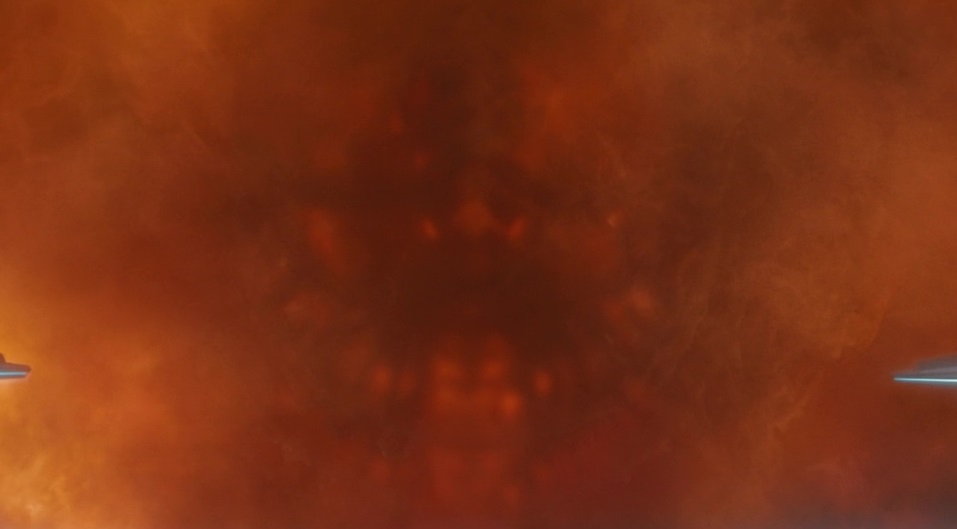
We didn’t get a clear look at Unknown Species 10-C, as their representative was partially obscured by a cloud of swirling gas. Nevertheless, the visual effects on this side of the story were mostly high-quality, and Unknown Species 10-C themselves at least seem like they’ll be visually interesting if we ever get a better look at them. I actually got a slight “Mass Effect Leviathan” vibe from what we glimpsed of Unknown Species 10-C. The design of the hyperfield was likewise interesting; it appeared much more solid than I had been expecting based on the holographic projections seen in previous episodes. Seeing it go from solid-metallic looking to swirling like fluid was also a very cool visual effect that Discovery executed well.
The only visual that I felt was a bit of a miss was Unknown Species 10-C’s shuttle pod/diplomatic chamber. When it arrived in Discovery’s shuttlebay it looked rather bland and low-quality, like a video game where a texture hasn’t loaded properly. It was clearly designed to look similar to the hyperfield, but I guess trying to blend that with a real set and real actors was difficult. It didn’t look awful, but it was noticeably lower quality when compared to the rest of the visual effects and animation work present in Species Ten-C.
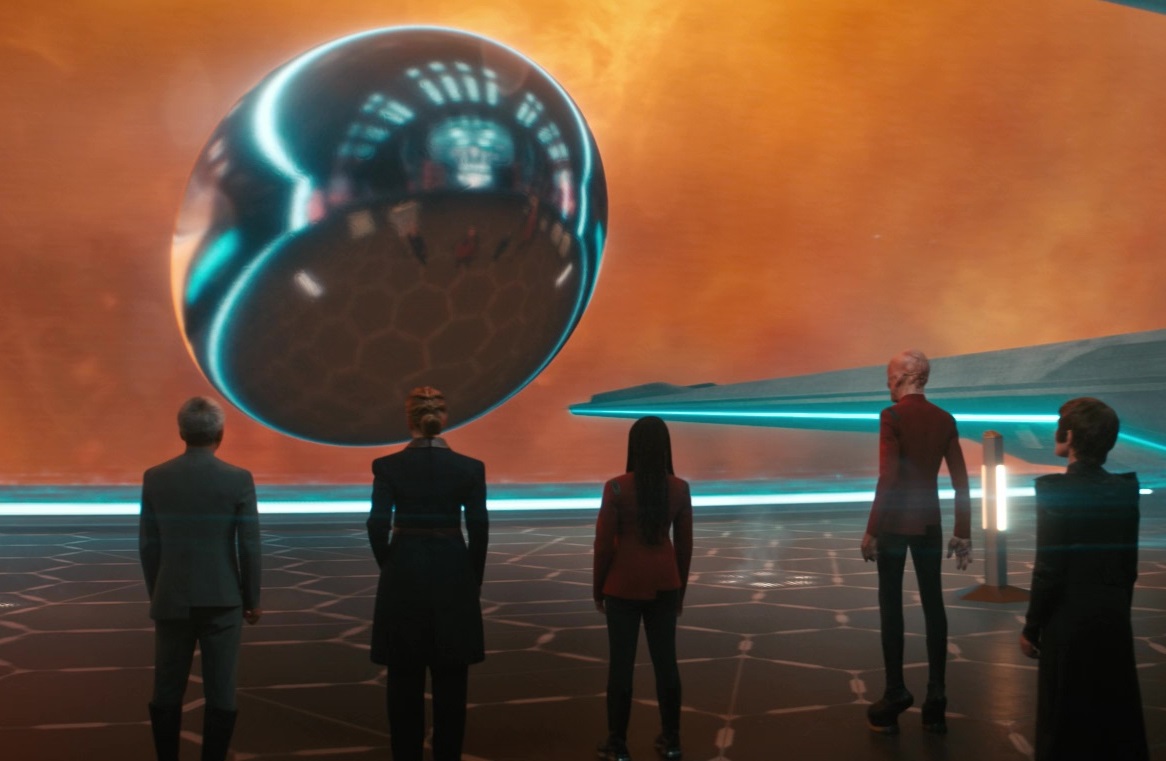
The idea of Unknown Species 10-C recreating part of Discovery as an environment for the crew works as a story point – I can quite understand why they’d choose to do something like that. But I confess that I rolled my eyes a little when I saw Captain Burnham and the others stepping onto the bridge set. It was understandable in the context of the story, but it didn’t make for a particularly impressive or interesting sequence when shown on screen. In fact, it almost makes Species Ten-C feel like a “bottle” episode – a Star Trek trope going all the way back to The Original Series where episodes would be set entirely aboard the ship.
As mentioned above when discussing Dr Hirai, President Rillak chose to bring both Captain Burnham and Saru when boarding Unknown Species 10-C’s diplomatic shuttle. And aside from totally sidelining Dr Hirai, this also left the command structure of Discovery and the rest of the mission uncertain. Rhys had the ship’s conn, as we’d see on the bridge near the episode’s climax, but who was in charge of the remaining delegates and the rest of the diplomatic mission? And how far did Rhys’ authority extend? Would he, for example, have been authorised to fire upon Unknown Species 10-C if time began to run out for Earth? Taking both the captain and first officer on this mission – when other experts were available – is a bit of an odd choice, and while of course as the audience we want to see our familiar characters leading the charge, it again makes the addition of some of these other delegates and experts feel like a bit of a waste.
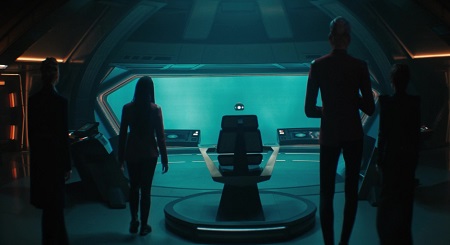
A longer episode – or a story which had arrived at the hyperfield earlier in the season – could have spent longer on the whole first contact thing, and I really think that would have been worth doing. I’m actually getting a bit of a familiar feeling the more I think about Species Ten-C: it reminds me of the finale of Picard Season 1 in the sense that the season dawdled a lot to get to this point, and it feels like there’s a lot of important story points left to get through with very little time remaining. As a result, some aren’t being given as much attention or screen time as they probably should receive. We aren’t at the same level as Et in Arcadia Ego – at least, not yet. But suffice to say that Season 4 as a whole has left its final episode with a lot of work to do to wrap up all of the major stories in a satisfying way.
There were a few very close-up shots of characters’ faces that made the cinematography in Species Ten-C feel a bit odd. Close-ups can work and can be dramatic, but their use here felt rather gratuitous, with the episode both beginning and ending with them in a way that made it feel like the director was throwing everything at the wall in an attempt to make things seem even more dramatic. As I’ve said on several occasions this season when discussing certain narrative choices, Discovery is already a series that brings plenty of drama to the table – trying to take it from a ten to an eleven can sometimes fall flat, and a few of these extreme close-ups definitely strayed very close to the line.
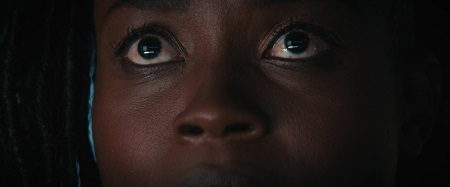
Book saw some significant character development this week after several episodes in which he felt very static. Although Tarka’s motivation for continuing to pursue the DMA’s power source feels pretty well-established by this point in the story, I’ve been finding it increasingly difficult to reconcile Book’s presence on this side of the story in the aftermath of the failure of the isolytic weapon back in Rubicon. We hadn’t seen or heard enough from Book since that dramatic event to signal that he’s still on board with the next phase of Tarka’s plan – and this week he actually seems to have moved much closer to Burnham’s position.
Book’s cause is noble: he wants to stop the DMA from hurting anyone else in the way it destroyed his home and hurt him. And seen in that context, his decision to get on board with Tarka’s weapon plan was understandable. In Rubicon, Book indicated he would be willing to stand down for a short time to give diplomacy a chance to play out, and in the aftermath of the failure of the weapon, it wasn’t clear at all why he continued to follow Tarka. I’m still not exactly sure how he arrived at this point – was he motivated by fear of repercussions for the use of the weapon? Did he still believe it would be possible to destroy it after Tarka failed once? If so, is he now no longer willing to let Captain Burnham try for a diplomatic solution first?
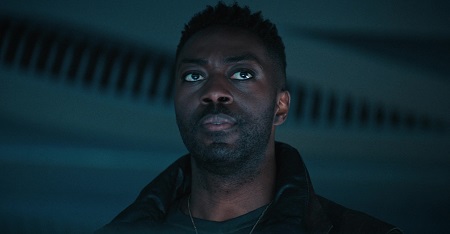
These points were glossed over in Species Ten-C, but we finally got some movement from Book, arguably bringing him back into the fold as one of the “good guys.” It emerged that Tarka’s plan would destroy the DMA, destroy Earth, and destroy the hyperfield containing Unknown Species 10-C and the USS Discovery – so Book didn’t really have a choice! Again, this is Discovery pushing the story to extremes, and it feels as though Book coming back to the light is more of a necessity than a choice at this point. Still, it worked, and for the first time in several episodes I felt like I could relate to Book as a fully-rounded character again, not just a plot device caught up in the narrative wake of other characters with more volition.
There’s even a message in Book’s story, if we look a little deeper. The idea that grief can lead someone to a very dark place was already something we’d seen explored a little with Book earlier in the season, but now we can add into the mix themes of manipulation, of being lied to, and of getting involved with someone untrustworthy. It was initially grief that saw Book teaming up with Tarka, but he also had the noble objective of wanting to prevent others from having to experience that same level of grief. Unfortunately for Book, he relied on someone who turned out to be unworthy of his trust – and that’s how he ended up in this particular predicament.
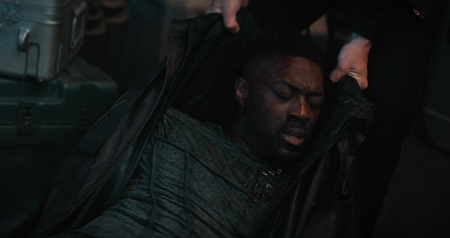
Reno saw her best scenes of the entire season on this side of the story, too. We’ll have to try to excuse the lousy “kidnapping” plot last week, because as weak and difficult to explain as that may have been, it ended up going somewhere significant. It didn’t necessarily have to be Reno as the one to reach out to Book – basically anyone on board the ship could’ve done so – but it was interesting to see her in this situation. Her words managed to reach him in a way that even Captain Burnham hadn’t been able to, and the sequences between the two of them worked exceptionally well.
Reno has often been used as a light-hearted character, bringing moments of deadpan comic relief that could lead to brighter moments in otherwise dark stories. This time, her role harkened back to her introduction in Season 2 – which was also referenced this week – when we first encountered her trapped aboard a crashed starship. A more serious performance from a comedic character carried a surprising amount of weight, and perhaps it’s because we know how Reno usually behaves and speaks that her words to Book meant a lot.
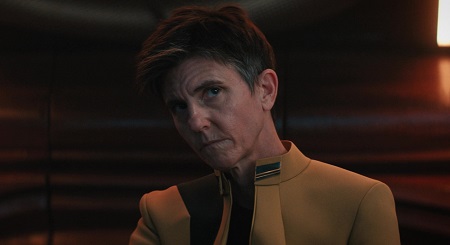
For at least the past three episodes, Discovery seems to have been building up to a conclusion which is going to say something like: “if only Tarka and Book had told Captain Burnham what they were doing! It should have been possible for everyone to get what they want through diplomacy and communication!” and I don’t think that’s changed. It isn’t exactly formulaic, and there are still big questions about what Unknown Species 10-C will do and how Captain Burnham will respond to try to cool things down in the time that remains. But one way or another, the story’s going to get to that place.
As we approach the end of the season, feeling like we know roughly where the story is going to go was to be expected, I guess! And on its own merits, Species Ten-C was a good episode, one of the better offerings from Season 4 for certain. Whether it has moved things along far enough for the season finale to wrap up all of the remaining narrative threads is an open question, one we’ll have to wait until next week to get an answer for.
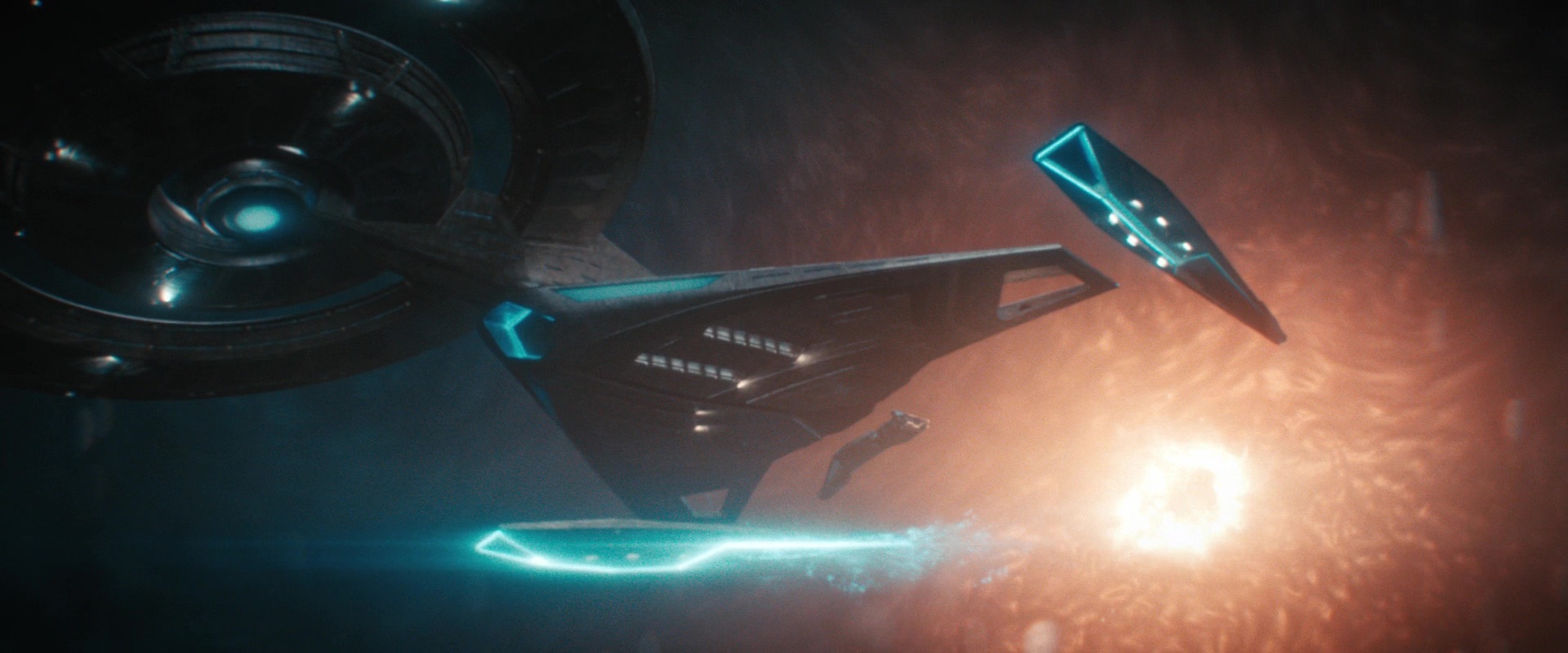
Although I had some nitpicks within the story, overall I had a good time this week. Species Ten-C told a very “Star Trek” story, with perhaps some inspiration from the film Arrival in there too! Meeting a brand-new alien race and learning how to communicate is something truly interesting, and my biggest complaint is that I would have liked to have seen more of it – for the season to have reached this point a couple of episodes ago so we could have spent longer with Captain Burnham, Saru, President Rillak, and Dr Hirai as they worked on figuring out how to use a complex arrangement of lights and pheromones to communicate. It was nice to see some significant movement from Book, too, after several uninteresting or flat episodes on that side of the story.
Did Season 4 need to turn Tarka into a villain? I think that could be a question for a longer essay once the season has wrapped up! I could certainly entertain the argument that the Unknown Species 10-C story – one of misunderstanding, communication, and first contact – was strong enough to carry both this episode and the bulk of the season without requiring this kind of last-minute character twist. Between the DMA and the smaller character moments – some of which, as noted last week, haven’t been as thoroughly explored as they could have been – maybe it would have been better overall to find a different way to include Tarka. But we’ll talk about that more in the weeks ahead, perhaps.
For now, there’s only one episode remaining! This time next week it’ll be all over… or will it? Could a cliffhanger ending be on the cards?
Star Trek: Discovery Season 4 is available to stream now on Paramount+ in the United States, Scandinavia, Latin America, and Australia. The show is on Pluto TV in the UK, France, Germany, Italy, and other parts of Western Europe at 9pm on Fridays and Saturdays. Individual episodes or the full season can be purchased on iTunes, Amazon Video, Google Play, and possibly other platforms in the UK, parts of Europe, and select other countries. The Star Trek franchise – including Discovery and all other properties mentioned above – is the copyright of Paramount Global. This article contains the thoughts and opinions of one person only and is not intended to cause any offence.



